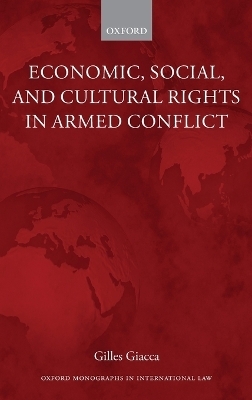
Economic, Social, and Cultural Rights in Armed Conflict
Oxford University Press (Verlag)
978-0-19-871744-7 (ISBN)
This book addresses the international legal obligation to protect economic, social, and cultural human rights in times of armed conflict and other situations of armed violence. These rights provide guarantees to individuals of their fundamental rights to work, to an adequate standard of living (food, water, housing), to education, and to health. Armed violence can take many forms, from civil unrest or protest and other forms of internal disturbances and tensions to higher levels of violence that may amount to armed conflict, whether of an international or of a non-international character. However, in all such cases the protection of ESC rights is sorely challenged.
Situations of actual or potential violence present a number of challenges to the application and implementation of human rights law in general and socio-economic rights obligations more specifically. This book sets out the legal framework, defining what constitutes a minimum universal standard of human rights protection applicable in all circumstances. It assesses the concept and content of ESC rights' obligations, and evaluates how far they can be legally applicable in various scenarios of armed violence. By looking at the specific human rights treaty provisions, it discusses how far ESC rights obligations can be affected by practical and legal challenges to their implementation. The book addresses the key issues facing the protection of such rights in times of armed conflict: the legal conditions to limit ESC rights on security grounds, including the use of force; the extraterritorial applicability of international human rights treaties setting out ESC rights; the relationship between human rights law and international humanitarian law; and the obligations of non-state actors under human rights law and with particular relevance to the protection of ESC rights. The book assesses the nature of these potential challenges to the protection of ESC rights, and offers solutions to reinforce their continued application.
Dr Gilles Giacca is a Research Fellow at the Law Faculty and Co-ordinator of the Oxford Martin School Human Rights for Future Generations programme. He holds a MA from the Graduate Institute of International and Development Studies (IHEID) in Geneva and a LLM from the University of Essex and holds a PhD in International Law from the University of Geneva and IHEID. Between 2006 and 2012, Gilles Giacca was teaching assistant and then research fellow at the Geneva Academy of International Humanitarian and Human Rights Law. Gilles has advised States, international organizations and NGOs on matters of international law. He has also provided training on international law to diplomats and practitioners. His teaching interests include the law of armed conflict and international human rights law.
Introduction ; 1. Treaty Obligations of States for Economic, Social, and Cultural Rights: Theory and Assessment ; 2. Limitations on Conventional Economic, Social, and Cultural Rights on Security Grounds ; 3. Territorial Scope of Application of Treaty-based Economic, Social, and Cultural Rights ; 4. Economic, Social, and Cultural Rights and International Humanitarian Law ; 5. Human Rights Obligations of Armed Non-state Actors ; Conclusion
| Erscheint lt. Verlag | 14.10.2014 |
|---|---|
| Reihe/Serie | Oxford Monographs in International Law |
| Verlagsort | Oxford |
| Sprache | englisch |
| Maße | 168 x 241 mm |
| Gewicht | 638 g |
| Themenwelt | Recht / Steuern ► EU / Internationales Recht |
| Recht / Steuern ► Öffentliches Recht ► Völkerrecht | |
| Sozialwissenschaften ► Politik / Verwaltung | |
| ISBN-10 | 0-19-871744-X / 019871744X |
| ISBN-13 | 978-0-19-871744-7 / 9780198717447 |
| Zustand | Neuware |
| Haben Sie eine Frage zum Produkt? |
aus dem Bereich


